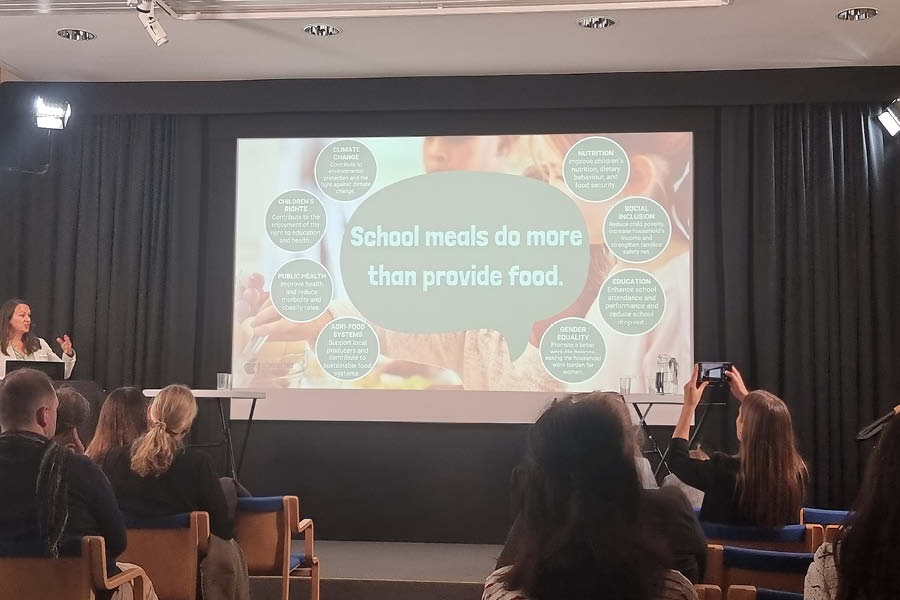On the 18th of October, the FAO Swedish Committee, Swedish Food Agency and SIANI organised the Swedish Celebration of the World Food Day, where the emphasis was on school meals’ contribution to the UN Charter for the Right to Food and to the achievement of the SDGs.
After air and water, food ranks as the third most essential human need, and everyone should be entitled to adequate nourishment. However, millions of children worldwide attend school daily without eating, and this hunger impairs their focus and ability to learn and develop.
In that sense, school meal programmes offer a solution to this challenge. These initiatives, spanning multiple sectors, significantly enhance children’s education, health, and nutrition. Additionally, they benefit entire communities by serving as a crucial safety net while also bolstering food systems and local economies.
Global food security and school meals
The opening remarks from Don Erickson, the Swedish State Secretary for Rural Affairs, highlighted the global food insecurity problem and the need to integrate school meals into broader food security solutions.
As such, as Mr Erickson stressed, the recent report on the State of Food Security and Nutrition in the World 2024, alarmingly pinpoints that hunger and food security have recently increased significantly, with between 713 and 757 million people facing hunger in 2023. Hence, the world is off-track to meet Sustainable Development Goal Targets 2.1 (ending hunger and food insecurity) and 2.2 (eradicating all forms of malnutrition).
Additionally, Mr Erickson emphasised that school meal programmes can serve multiple purposes, including improving food security, supporting agriculture, creating jobs, and enhancing educational outcomes, which, in turn, play a vital role in fighting hunger and malnutrition. He also points out that while Sweden has a long tradition of providing free, nutritious school meals, many countries still struggle to offer similar services. Globally, 41% of children globally receive some form of free or subsidised school meal, a number that rises to 61% in high-income countries.
He calls for global cooperation to ensure that all children, no matter where they are, have access to nutritious meals.
Marie Durling, from the World Food Program (WFP), underlined the importance of early childhood nutrition within the 1,000 days of life for brain development, physical growth, and lifelong health. If children experience malnutrition during these early years, it can lead to irreversible damage, resulting in stunted growth and cognitive impairments. Globally, nearly half of all child deaths under five are linked to malnutrition, which has both short-term and long-term economic impacts. In low- and middle income countries, the financial impact of malnutrition-related losses can reduce up to a 10% in GDP due to healthcare costs and lost productivity. By focusing on improving nutrition during the first 1,000 days of life, as well as throughout adolescence, we can help mitigate these losses.
The right to food and school meal programmes
Nancy Aborto, Deputy Director at the Food and Nutrition Division of FAO, spoke about the importance of the right to food as a human right and how school meals can help actualise this right. She highlighted the global challenge of food insecurity, worsened by conflicts, climate change, and economic disparity. Ms Aborto stressed that good nutrition, particularly for children, is central to achieving human development goals like education and health. Providing children with diverse, safe, and nutritious food at school lays the foundation for healthy development.
The FAO is working closely with the WFP and the German government to develop nutrition standards for school meals. These standards aim to meet essential nutritional and cultural needs, while promoting environmental sustainability, social equity, and education. Ms Aborto called for integrating these guidelines into national policies to ensure long-term sustainability.
Global initiatives and Sweden’s role in school meals
School meal programmes are also promoted with global and national initiatives. Maria Rojas, Deputy Director of the School Meals Coalition, presented the Coalition’s goals of expanding access to school meals, particularly in low-income and conflict-affected areas, and improving programme quality. Since its formation in 2021, the coalition has grown to 103 member states, highlighting the role of school meal programmes in achieving SDGs, including zero hunger, education, gender equality, and reducing inequalities.
In Sweden, Emelie Elin, from the Swedish Food Agency discussed the history of the country’s school meal program, established over 70 years ago. Swedish schools serve nutritious, eco-friendly meals to nearly 2 million children daily, and adhere to national guidelines, emphasising safety, nutrition, environmental sustainability, taste, an enjoyable eating environment, and education. Challenges remain in integrating school meals into educational curriculums to teach children about healthy diets, local agriculture, and sustainability as well as ensuring safe and inclusive dining environments for all.
Lastly, governments, private sector partners, and NGOs must work together to ensure that every child has access to nutritious and sustainable school meals by 2030.
Key takeaways:
- Improving collaboration across silos in using school meals with a holistic approach
- Monitoring the implemented initiatives, with for instance impact assessments, for a perpetual enhancement and to be able to follow the achievement of objectives
- Looking at school meals as an investment that reduces costs in the long term rather than focusing on short-term costs
- Enhancing food access in fragile settings to leave no one behind
Written by David Mingasson, SIANI reporter
Watch the recording:
